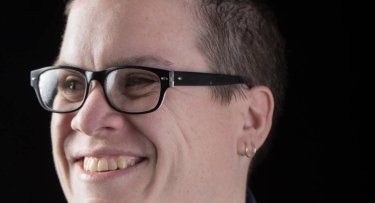
Diana Wilkins CNR SAS ’02, is a nonprofit consultant, adjunct professor and poet who has dedicated her career to advocating for the LGBTQIA+ community.
For the past 15 years, Wilkins has worked with nonprofits in roles ranging from grassroots community organizer, to marriage equality advocate, to event planner for large-scale LGBTQIA+ community events. While working for VCS Inc.—a mental health counseling and advocacy organization in Rockland County, New York—Wilkins organized the annual “Rockland Pride Sunday.” During her time at the Center for Safety & Change, she developed LGBTQIA+ programming and worked directly with domestic violence and sexual trauma victims.
In 2016, Wilkins and a few colleagues from VCS Inc. decided that it was time to open a local community center dedicated to the LGBTQIA+ community, so they founded the Rockland County Pride Center in Nyack, New York, which is known today as the Phyllis B. Frank Pride Center of Rockland County. Wilkins served as the deputy director until 2021. “We built one of the best community centers that's out there for LGBTQ+ individuals,” she said. “And I learned so much about not only how to start an organization but also how to make it sustainable and how to provide accountable and life-sustaining service to the community.”=
Wilkins says that she has seen progress in terms of LGBTQIA+ rights and the availability of support services over the years—especially when the marriage equality legislation passed in 2011 in New York State and the Supreme Court decided in favor of same-sex marriage in 2015—but she asserts that there is still a lot of work to do: “Whenever there's progress made, someone always gets left behind. And in the LGBTQ movement historically, transgender people are the ones left behind. More and more, we're seeing trans-led organizations asking for help—not because they don't know how to lead but because the system is broken, so they're not getting the funding or support they need. There’s also a lot of need still in local communities. Serving LGBTQ+ folks is not only about changing policy but also about supporting real people living their best, authentic lives—helping them get bus tickets and deal with food insecurity, for example.”
For the past year, Wilkins has been leveraging her nonprofit expertise to support other organizations locally and across the country. Her nonprofit consulting company, Social Justice Initiatives LLC, offers services including marketing, grant writing and strategic planning. She hopes to grow this business in the coming years to support more deserving organizations and causes.
Much of Wilkins’ consulting work draws on her writing skills, which she was refining back in her time at the College of New Rochelle (CNR). After starting college as a journalism major, she discovered a love for English literature—specifically poetry—during her sophomore year at CNR. She graduated with a bachelor’s degree in journalism and English and then pursued her love of writing poetry by earning a master’s degree in creative writing from Queen’s College and an M.F.A. from Lesley University. Now a published poet, she enjoys helping others discover their passion for the written word as an adjunct professor in English literature at Fairleigh Dickinson University, Ramapo College of New Jersey and Dominican University.
Beyond nurturing her love of writing and literature, CNR helped Wilkins come into her own as a person: “As a young gay woman who had just come out, the sense of family and support definitely shaped me. There were a lot of LGBTQ-identified women on campus, and it was a place where it was ok to be out. It was a magical and transformative time.”
It was at CNR that Wilkins got her first taste of making change: “We pushed the boundaries of how CNR saw us. We pushed to create a support group for lesbian students, for example. We were able to establish relationships and build space for people who were questioning their sexuality or gender identity, for the people who did not feel safe coming out. It meant that people did feel comfortable being who they were. It's almost indescribable what CNR did for us young queer women and how that shaped us to become who we are today.”
Wilkins turned those early experiences with creating safe spaces and making change into a successful nonprofit career dedicated to ensuring equitable resources and opportunities for all.
